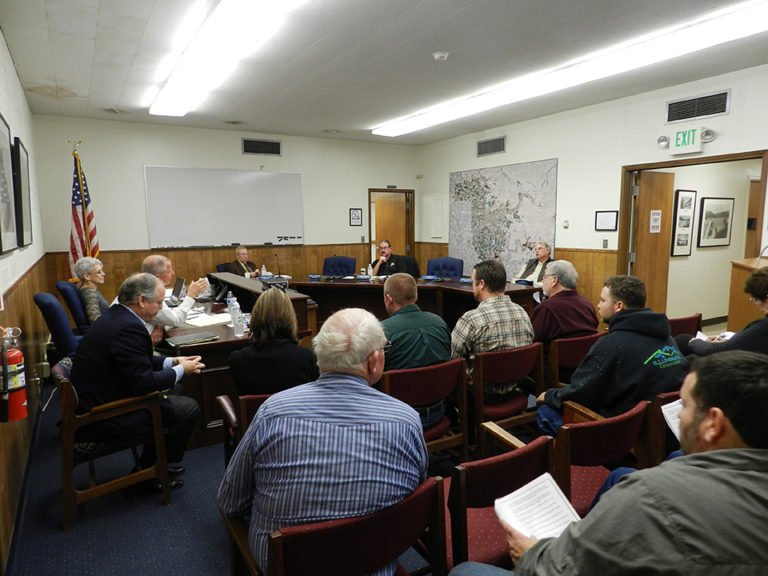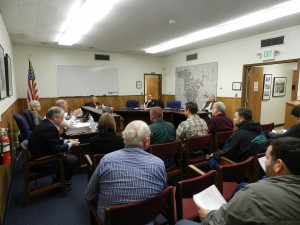

Despite little interest thus far in a fallowing program designed to make water available for sales next year, Oakdale Irrigation District (OID) will pursue plans to sell water to Westlands Water District.
Though OID General Manager Steve Knell has been under increasing pressure to keep OID water local, his Board of Directors continues to back his strategy of selling “surplus” water when available. Knell and OID attorney Tim O’Laughlin said Tuesday that the district needs to begin addressing requirements imposed by the California Environmental Quality Act at once if it should decide to sell water next year.
Westlands Water District has been a black hole for water deliveries for decades and the ongoing drought has highlighted the folly of sending water to places better suited for rangeland, wildlife, and recreation. Nonetheless, the political clout of corporate ag has made Westlands a major player in the water game. And when it can’t get water through political machinations, the district has plenty of money to dominate the increasingly tight water market.
According to a Bloomberg report, water was $1100 an acre foot in Westlands Water District this year, for those who could get it. Even north of Sacramento, where it’s usually plentiful, water was selling for $500 an acre foot.
Those figures make OID’s proposal to sell water to Westlands for $400 an acre foot a bit puzzling. Why would OID announce the price before next year’s market prices have been determined? And better yet, why would OID offer a rate so far under this year’s average?
When Oakdale farmer Louis Brichetto tried to offer an alternate proposal to the OID fallowing plan, he was interrupted by OID Board Chairman Steve Webb and told his comments weren’t relevant. But Brichetto is among a growing number of local citizens who believe OID should be devoting more effort to keeping local water local.
In a scathing rebuttal to OID Director Frank Clark’s recent justification for outside water sales, Families Protecting the Valley offered the following comments:
“Frank Clark and other directors of other water districts are going to have to adapt to what we see as the new reality with the new sustainable groundwater rules. From now on there will be no more ‘surplus water’ to sell to generate revenue. From now on any surplus water will need to go directly into the underground to replace any water that has been pumped. The days of surplus surface water are over.”
There may have been a time when the notion of “surplus water” offered at least the illusion of sense. That time is long past. And anyone who needs a reminder of the ongoing and escalating environmental problems in Westlands Water District has plenty of sources to choose from. The Los Angeles Times has a recent summary here.
Actually, two dozen OID customers representing about 800 acres already have returned initial solicitation forms, with more interest expected. Collectively, they represent about 3,000 acre-feet of water. Remember: the program is voluntary. No one has to enroll. And the intent is to help these farmers finance necessary — and expensive — irrigation efficiency improvements on their property so they can use less water in the future. Not sure why anyone would be opposed to that.
Paul Harvey? Is that your real name? I ask because your linguistic patterns are remarkably similar to those of Dave Lyghtle, former general manager of the Modesto Bee and current paid PR man for Oakdale Irrigation District. Mr. “Harvey,” do you care to verify your true identity?
The point being, Eric, that you were in error when you said there was “little interest” in the innovative — and voluntary — On-Farm Conservation Program. OID farmers apparently appreciate the opportunity to participate in a project that will help them invest in important and long-lasting water conservation efforts on their property. You may philosophically disagree with the premise, but please use facts, and not emotion, to support your position.
Dave: Thank you for revealing your true identity. My report about interest in the fallowing program is based on Steve Knell’s own words during the OID Board meeting. Knell said that since he had only “a little paper” he would “wait until January” to decide whether to pursue the fallowing program. You were at the meeting and thus should be able to confirm the accuracy of the report. Also, others were at the meeting who can verify the accuracy of what I’ve written. Of course, since you are on the OID payroll, you may be privy to information I don’t have. In that case, we welcome updated reports. As for basing reports on “emotion,” I did not base this report on emotion: I reported the facts. I also did not get paid to spin news for OID or anyone else.
Thank you Mr. Caine for pointing out the illogic of the Oakdale Irrigation District in proposing to sell water at below market rates during a drought. If we don’t receive any more rain during the remainder of the season, the rate payers of OID will have been poorly served by any water sale.
Westlands is not a sustainable farming operation over the long term. The area will never have enough water without depriving other jurisdictions of what they need. California’s population has grown too large to support all of the demand.
If coastal communities obtained their water through desalinization plants, inland water could be freed up to serve Westlands. Too bad that common sense does not seem to be prevalent in water management and that we will face chronic shortages in the future because of shortsighted actions of those who think they have the right to sell public water for private profit.
Comments are closed.